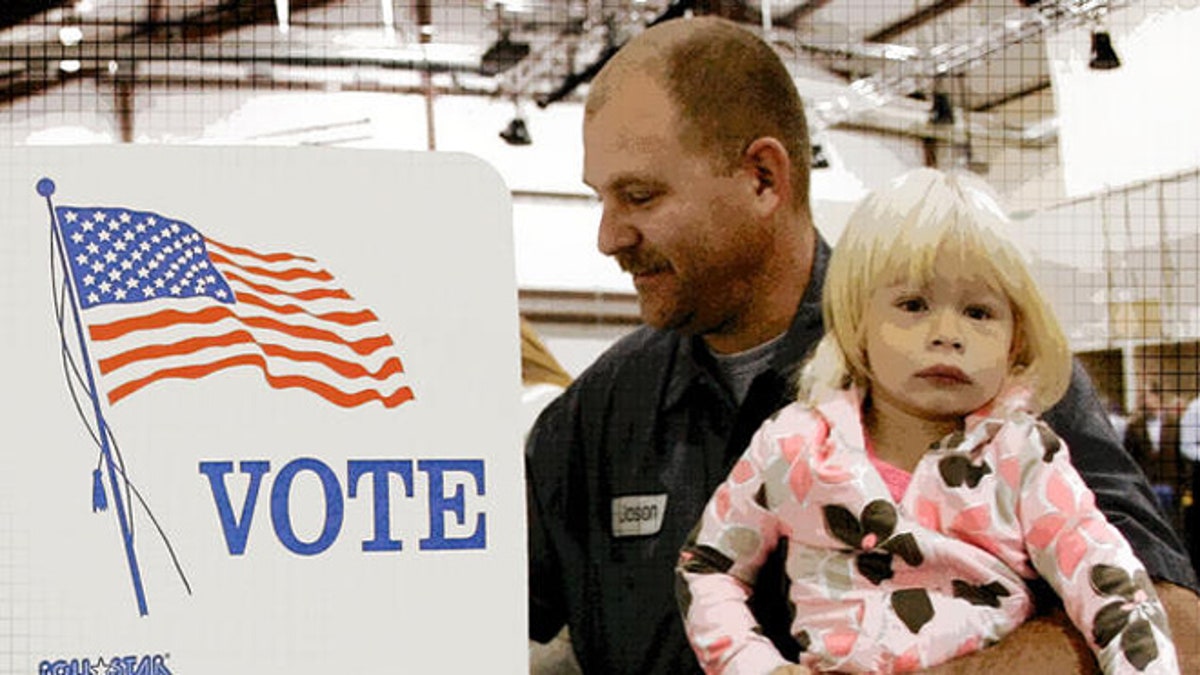
FILE: Nov. 2008: A voter holding a child casts a ballot in Edmond, Okla. (AP)
Forget the polls. The gauge of success in this year's presidential election could come down to another indicator -- how many Americans are making babies.
While the pundits pore over the latest approval ratings and economic outlooks to test the mood of the nation, this often-overlooked measure of consumer confidence speaks volumes.
The fertility rate has long been linked by economists to the health of the economy. It's unclear what that rate will be come election day -- but right now, projections show confidence is down in an historic way. If the trend holds, it's another sign that President Obama will have to counter a pessimistic mood to win a second term.
"The economy is really affecting the fertility decisions for some people," said Dr. Samuel Sturgeon, president of the fertility forecasting firm Demographic Intelligence.
The U.S. fertility rate has declined steadily since reaching an all-time high in 2007.
There were a record 4,316,233 births that year, according the Pew Research Center. But even as the U.S. population has grown, provisional data places the number of births in 2010 at slightly more than 4 million.
For a moment, amid fleeting positive economic news, it appeared the decline had halted. In January, Demographic Intelligence proclaimed the "Baby Bust" was over, and projected the total fertility rate, or births per woman, would rise from 1.93 in 2010 to 1.98 in 2012 – though still down from a high of 2.12 in 2007.
But in April, pointing to lingering effects from the recession -- "unusually high" unemployment and economic fear among young adults who might otherwise have children -- the firm projected the rate would instead fall to a 25-year low of 1.89 in 2012.
That’s a dim outlook for the current president.
Since the Reagan administration, baby boom years have tended to bode well for the party in power.
The fertility rate ticked up from 15.5 births per 1,000 people in 1983 to 15.7 in 1984, according to data from the World Bank. President Ronald Reagan was re-elected that year in a landslide over Democrat Walter Mondale. It rose again from 15.5 in 1987 to 15.9 in 1988, when then-Vice President George H.W. Bush kept the White House in Republican hands.
The rate continued to rise, to 16.2 in 1989 and 16.7 in 1990. But as the recession of the early 1990s took hold, it declined to 16.3 in 1991 and 15.9 in 1992 -- when the incumbent Bush was defeated by Democrat Bill Clinton.
Subsequent presidential elections showed a similar connection between fertility rates and elections.
So with rates on the downswing, does that mean Mitt Romney’s a shoo-in?
Not so fast, said author Steve Sailer.
Sailer examined the white fertility rate in the 2000 and 2004 elections -- a demographic that generally is more supportive of Republicans.
"What the Republicans benefit from are white people getting married and having kids -- this is the core of Republican voters," he said. "We've seen a drop-off in fertility and drop-off in marriage. Basically, you've got a lot of younger white people living in their parent's garage. None of that bodes well for Republicans in 2012."
Notably, the most recent downturn has not been felt equally across the political spectrum, according to Dr. S. Philip Morgan, a sociology professor at the University of North Carolina.
Morgan concluded that Republican-leaning states he studied responded more strongly to the unemployment increases of the Great Recession than Democratic states; namely, fertility rates in red states decreased at a more pronounced rate than they did in blue states.
"Why would it happen more strongly in a red state?" he said. "Because they see things more negatively."
Consider that every monthly jobs report is now greeted with two inevitable responses. Republicans crow about how many consecutive months the unemployment rate has been stuck over 8 percent, while Democrats highlight the number of consecutive months the private sector has added jobs.
"I think if the Republicans win, conservatives will feel better about the world," Morgan said. "And as a result, conservatives might be happier when they wake up in the morning, they might be willing to have another kid, and they might be willing to buy a new car."




